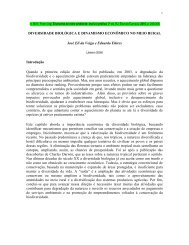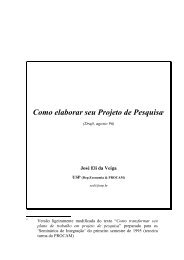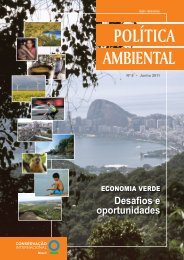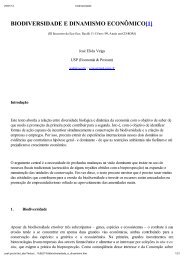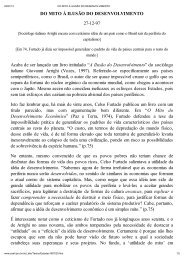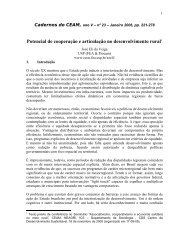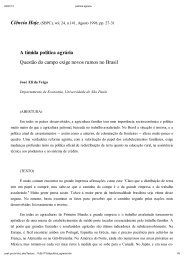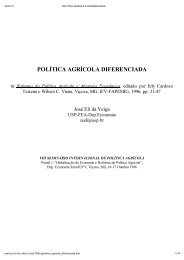sustainable development 20 years on from the ... - José Eli da Veiga
sustainable development 20 years on from the ... - José Eli da Veiga
sustainable development 20 years on from the ... - José Eli da Veiga
You also want an ePaper? Increase the reach of your titles
YUMPU automatically turns print PDFs into web optimized ePapers that Google loves.
66<br />
<str<strong>on</strong>g>20</str<strong>on</strong>g>09). In additi<strong>on</strong> to envir<strong>on</strong>mental c<strong>on</strong>cerns, <strong>the</strong>re is <strong>the</strong> fact that few countries have a scheme for <strong>the</strong><br />
<str<strong>on</strong>g>development</str<strong>on</strong>g> of <str<strong>on</strong>g>sustainable</str<strong>on</strong>g> mining operati<strong>on</strong>s that would integrate this industry’s potential into nati<strong>on</strong>al<br />
and community <str<strong>on</strong>g>development</str<strong>on</strong>g> objectives by ensuring <strong>the</strong> effective participati<strong>on</strong> of <strong>the</strong> surrounding<br />
communities, al<strong>on</strong>g with <strong>the</strong> State and mining companies, in decisi<strong>on</strong>-making.<br />
Major inter-generati<strong>on</strong>al challenges for countries with large mining or drilling industries include<br />
<strong>the</strong> creati<strong>on</strong> of producti<strong>on</strong> linkages and <strong>the</strong> introducti<strong>on</strong> of fiscal mechanisms that will channel <strong>the</strong> wealth<br />
created by <strong>the</strong>se industries (especially in <strong>the</strong> case of windfall profits) to society and use it to generate<br />
sources of ec<strong>on</strong>omic growth for future generati<strong>on</strong>s. Countries that are reaping huge oil profits also have to<br />
devise policies for managing and distributing those profits efficiently if <strong>the</strong>y are to avert inflati<strong>on</strong>ary<br />
shocks and un<str<strong>on</strong>g>sustainable</str<strong>on</strong>g> increases in <strong>the</strong> value of <strong>the</strong>ir currencies, which could hurt <strong>the</strong>ir export sectors<br />
(Altom<strong>on</strong>te, <str<strong>on</strong>g>20</str<strong>on</strong>g>08). The boom in mining and oil profits should enable <strong>the</strong>se countries to fully cover <strong>the</strong><br />
envir<strong>on</strong>mental costs and c<strong>on</strong>tribute, via fiscal or o<strong>the</strong>r means, to nati<strong>on</strong>al <str<strong>on</strong>g>development</str<strong>on</strong>g>.<br />
In order to finance initiatives for expanding <strong>the</strong>ir capacity for innovati<strong>on</strong> and technology, <strong>the</strong><br />
countries of <strong>the</strong> regi<strong>on</strong> have established charges or royalties <strong>on</strong> metal and n<strong>on</strong>-metal mining, such as <strong>the</strong><br />
royalty charged in Chile since <str<strong>on</strong>g>20</str<strong>on</strong>g>06 (see chapter V), or to finance infrastructure, as in <strong>the</strong> case of <strong>the</strong> new<br />
tax system promulgated in Peru in September <str<strong>on</strong>g>20</str<strong>on</strong>g>11. These charges fuel additi<strong>on</strong>al tax inflows, which will<br />
be used to build facilities such as hospitals, schools and roads in <strong>the</strong> poorest areas of <strong>the</strong> country (Ministry<br />
of Mining and Energy of Peru, <str<strong>on</strong>g>20</str<strong>on</strong>g>11).<br />
Once <strong>the</strong> importance of preserving sound ecosystems is understood and <strong>the</strong> value of <strong>the</strong> services<br />
<strong>the</strong>y fulfil is appreciated , <strong>the</strong>se systems may start to compete with natural resource explorati<strong>on</strong>. 16 One<br />
interesting case relating to extractive industries (in this instance, oil) and climate change is that of <strong>the</strong><br />
Yasuní Nati<strong>on</strong>al Park in Ecuador, where <strong>the</strong> Government has offered to refrain <strong>from</strong> tapping <strong>the</strong> oil fields<br />
located <strong>the</strong>re in exchange for financial compensati<strong>on</strong> <strong>from</strong> <strong>the</strong> internati<strong>on</strong>al community. 17<br />
(b)<br />
Agriculture<br />
Agriculture makes a c<strong>on</strong>siderable c<strong>on</strong>tributi<strong>on</strong> to GDP, export earnings, employment and rural<br />
livelihoods throughout <strong>the</strong> regi<strong>on</strong>. The land area devoted to irrigated crop-farming, especially for export<br />
commodities, has expanded in <strong>the</strong> last two decades, and livestock and aquaculture industries have grown<br />
as well (ECLAC/FAO/ IICA, <str<strong>on</strong>g>20</str<strong>on</strong>g>10). This expansi<strong>on</strong> has had a c<strong>on</strong>siderable impact <strong>on</strong> changes in land use<br />
and <strong>on</strong> greenhouse gas emissi<strong>on</strong>s. The Latin American and Caribbean regi<strong>on</strong> is sec<strong>on</strong>d <strong>on</strong>ly to East Asia<br />
in terms of emissi<strong>on</strong>s generated by <strong>the</strong> agricultural sector. As in o<strong>the</strong>r regi<strong>on</strong>s, nitrous oxide emissi<strong>on</strong>s are<br />
due mainly to <strong>the</strong> use of fertilizers in <strong>the</strong> soil and methane emissi<strong>on</strong>s are due mainly to enteric<br />
fermentati<strong>on</strong> in livestock. With increasingly vast tracts of land being used for agriculture and livestock<br />
rearing, <strong>the</strong> use of nitrogen fertilizers has escalated and cattle herds have grown with an inevitable surge,<br />
as already menti<strong>on</strong>ed, in nitrous oxide and methane gas emissi<strong>on</strong>s (Smith and o<strong>the</strong>rs, <str<strong>on</strong>g>20</str<strong>on</strong>g>07).<br />
16<br />
17<br />
The Millennium Ecosystem Assessment (<str<strong>on</strong>g>20</str<strong>on</strong>g>05) defines ecosystem services as <strong>the</strong> benefits that human beings<br />
obtain <strong>from</strong> ecosystems: provisi<strong>on</strong>ing services such as food, water, timber, fibre and genetic resources;<br />
regulating services such as climate, floods, diseases and water quality; cultural services, such as recreati<strong>on</strong>al,<br />
aes<strong>the</strong>tic and spiritual benefits; supporting services, such as soil formati<strong>on</strong>, pollinati<strong>on</strong> and nutrient cycling.<br />
These services are not developed in this secti<strong>on</strong> since, although <strong>the</strong>y are vital for ensuring o<strong>the</strong>r types of services,<br />
<strong>the</strong>y are not used directly by humans (see [<strong>on</strong>line] http://www.greenfacts.org/en/ecosystems/millenniumassessment-2/2-ecosystem-services.htm#1).<br />
See [<strong>on</strong>line] http://yasuni-itt.gob.ec/.



